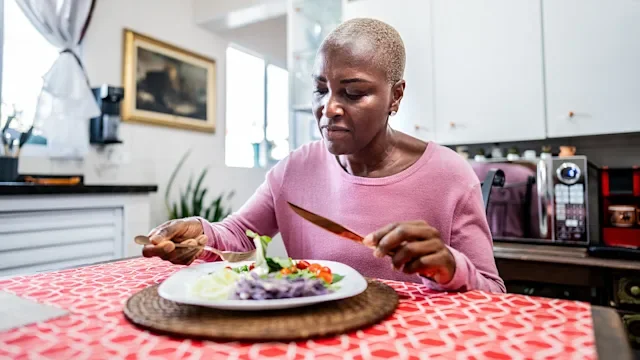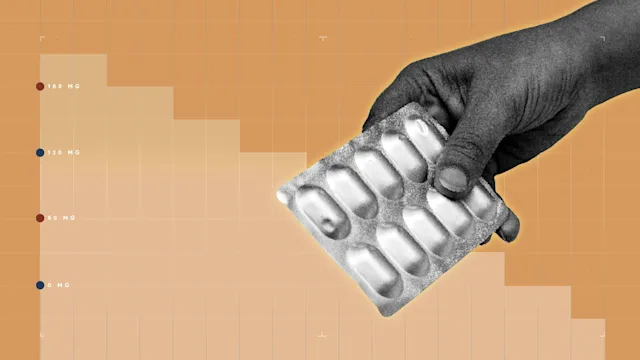Key takeaways:
Menopause can cause many symptoms that affect sex, like vaginal dryness, a lower sex drive, and mood changes. Some symptoms can make sex uncomfortable or even painful.
If you have discomfort with sex, you can use lubricants and vaginal moisturizers to help vaginal dryness. There are other strategies that may help improve your sex life.
In some cases, it’s helpful to see a healthcare professional, who can prescribe hormone therapy or medications to treat your symptoms.
Menopause can bring changes that affect your sex life. These can be physical, like vaginal dryness. Or they can affect your mood and desire for sex. And with age, there are often life circumstances, such as health problems and relationship issues like divorce, that can also affect your desire or opportunity to have sex.
Though your body and mind may go through changes as you age, you can still enjoy sex. That’s true whether it’s with a long-term partner, new partners in your life, or on your own.
Let’s take a closer look at how menopause can affect your sex life — and what you can do if you’re not feeling satisfied.
Can you still have good sex after menopause?
You can definitely have good sex after menopause. It’s true that aging and menopause can bring changes that affect your sex life. But despite these changes, you can still experience sexual satisfaction.
Sex is a big part of life for many people — no matter what stage of life you are in. According to an AARP survey, half of those over age 50 reported having sex in the past week. And for most older adults, sex is an important part of romantic relationships.
Sex might not be quite the same as when you were younger, and that’s OK. After all, there’s no “right” or “wrong” when it comes to your sex life. What really matters is whether you feel satisfied.
How does menopause change sex?
As you go through the transition to menopause, also called perimenopause, your ovaries gradually start making smaller amounts of estrogen and progesterone. This can affect your sex life in many ways — both physically and emotionally.
Let’s look at some of these symptoms and situations in more detail.
Vaginal dryness
Vaginal dryness is common during and after menopause. Before perimenopause, estrogen keeps the inside of your vagina plump, stretchy, and well-lubricated.
Natural supplements for better sex after menopause: Here are popular menopause supplements that may help.
Want to have better orgasms? We’ve got tips for better orgasms after menopause.
Does sex hurt? Learn about the different causes of painful sex and how to treat them.
As estrogen levels drop, it can make your vagina feel more dry. It can be harder for you to get lubricated (wet), even when you’re feeling turned on.
In some cases, the vaginal tissue can become more fragile and less flexible. This is called vaginal atrophy.
Vaginal dryness and atrophy can make sex uncomfortable and even painful. It may also put you at risk for bleeding or tearing during sexual intercourse.
- Vivelle-DotDotti and Estradiol
- ClimaraEstradiol
- DivigelEstradiol
Lower sexual desire (low libido)
It’s not just estrogen that decreases during menopause. Two other sex hormones start to go down, too: progesterone and testosterone. Lower levels of these hormones can cause you to have a lower sex drive (libido).
Vaginal dryness and atrophy can also lower your sex drive. If sex is less pleasurable — or even painful — it can have a big impact on your interest in sex.
Slower to orgasm
Lower estrogen can cause decreased blood flow to your genital area. This can make your clitoris less sensitive, and sex less pleasurable overall. All of these factors can make it harder to have an orgasm.
Mood changes
During perimenopause and menopause, it’s common to experience emotional challenges like changes in mood, depression, and anxiety. And emotions can definitely affect your sex life.
If you’re feeling stressed or unhappy, it can affect your relationships and may make you feel less interested in having sex. Your emotions can also make sex less fun or pleasurable, and make it harder to have an orgasm.
Sleep problems
Poor sleep is a common symptom of menopause. It can be caused by different things during menopause, including hormonal changes and stress. For many people, hot flashes and night sweats also make it hard to get a good night’s rest. And when you’re not sleeping well, it can make you less interested in sex.
Life challenges
Menopause typically happens in your 40s and 50s. This can be a time when you’re facing new responsibilities at home or work, or dealing with major life changes.
As you age, you might find yourself dealing with new health conditions or medications. Or maybe your body’s shape or physical abilities have changed.
Or you may find yourself dealing with divorce or with grief. All of these circumstances can affect your libido and sexual enjoyment.
Is it common for sex to be painful after menopause?
Yes, pain during sex (dyspareunia) is common during menopause. Vaginal dryness and decreased lubrication can make sex painful. In some people, the vagina may become tighter at the opening, causing pain with intercourse.
If you’re experiencing any of these symptoms and they’re affecting your sex life, it’s important to see your OB-GYN or other healthcare professional. Most vaginal symptoms related to menopause can be treated.
How to manage pain during sex after menopause
Here are some ways to help relieve dryness and pain during sex:
Try lubrication. Using a personal lubricant can help make sex more comfortable and enjoyable, especially if you’re experiencing vaginal dryness.
Use a vaginal moisturizer. These are moisturizers that you put in or around your vagina every couple of days. They keep the tissue moist and healthy. You can buy them over the counter.
In some cases, prescription medication can help with sexual problems. You can talk to your OB-GYN or another specialist to discuss these options.
Examples include:
Hormone replacement therapy (HRT): HRT replaces estrogen and progesterone in your body. There are many different types of HRT available.
Vaginal estrogen: Vaginal estrogen is a type of HRT that’s placed directly into your vagina. It comes in a cream, vaginal ring, or tablet. It’s used to treat vaginal dryness, pain during sex, and urinary symptoms.
Ospemifene (Osphena): Ospemifene is a nonhormonal oral medication that treats pain during sex caused by vaginal atrophy.
Dehydroepiandrosterone (DHEA): This is a suppository that you place in your vagina every night. It’s used to treat painful sex after menopause.
Tips for a better sex life after menopause
Here are some tips that can help boost your sex life during menopause:
Don’t rush sex. It can often take longer for your body to respond physically as you get older. Take your time when having sex, and allow yourself space and time to get aroused.
Talk with your partner. Communication is important when it comes to sex and intimacy. Talk to your partner about what you like and what turns you on. Even if you’ve been with the same partner for a while, you may need to make changes based on what feels good to you now — and what doesn’t.
Get comfortable. Sometimes, your flexibility and ability to move around can change with age. Certain sexual positions may be more comfortable than others. Consider using pillows or positioners to help you find a comfortable position during sex.
Explore new types of intimate activities. There are many different ways to be intimate as you age, beyond sexual intercourse. Consider exploring other sensual activities, like an erotic massage or sex-toy play.
Maintain healthy daily habits. Eating nutritious foods, getting good sleep, exercising, and avoiding alcohol can all help keep your sex drive strong.
Keep up with your physical and mental health. Your physical and mental health are linked to your sex life, too. If you’re dealing with a physical or mental health problem, staying on top of your treatment can be helpful for your sex life, too.
When to talk to a healthcare professional
If you’re feeling dissatisfied or unhappy about your sex life, it might be helpful to reach out to a healthcare professional. This could be your primary care provider or your gynecologist. They can help you figure out what’s causing your symptoms, and work with you to find a solution.
Many people also find it helpful to talk to a therapist about their sexual problems. This could include:
Frequently asked questions
Yes, drinking alcohol can affect your sex life. Alcohol can make your body less likely to respond to sexual stimulation. For some people, this could be more likely if you drink more than 1 drink per day.
No, you cannot naturally get pregnant after menopause. During perimenopause your periods slow down and stop. Once you’ve gone a full 12 months in a row without a period, you’ve officially completed menopause.
After completing menopause you can no longer naturally get pregnant. The exception is if you’re being treated with in vitro fertilization (IVF), which is still an option for some people.
Yes, you need to practice safe sex after menopause. Sexually transmitted infections (STIs) are still a possibility. It’s important to use protection, such as a condom, especially if you don’t know your partner’s sexual history.
If you’re widowed or divorced, you’re at greater risk of getting STIs. That’s likely because you may be dating and having sex with new partners.
Yes, drinking alcohol can affect your sex life. Alcohol can make your body less likely to respond to sexual stimulation. For some people, this could be more likely if you drink more than 1 drink per day.
No, you cannot naturally get pregnant after menopause. During perimenopause your periods slow down and stop. Once you’ve gone a full 12 months in a row without a period, you’ve officially completed menopause.
After completing menopause you can no longer naturally get pregnant. The exception is if you’re being treated with in vitro fertilization (IVF), which is still an option for some people.
Yes, you need to practice safe sex after menopause. Sexually transmitted infections (STIs) are still a possibility. It’s important to use protection, such as a condom, especially if you don’t know your partner’s sexual history.
If you’re widowed or divorced, you’re at greater risk of getting STIs. That’s likely because you may be dating and having sex with new partners.
The bottom line
Menopause can affect sex in many ways, from vaginal dryness to mood changes and a lower sex drive. But there are many things you can do to help. Using lubricants, communicating with your partner, and trying new activities can all go a long way. If you have discomfort during sex, reach out to a healthcare professional for treatment and support. Prescription medication or therapy may help relieve symptoms and make sex more enjoyable.

Why trust our experts?



References
Faubion, S. S., et al. (2015). Sexual dysfunction in women: A practical approach. American Family Physician.
Kakulla, B., et al. (2023). Ageless desire: Relationships and sex in middle age and beyond (ages 40-plus). AARP Research.
National Poll on Healthy Aging. (2018). Let’s talk about sex. University of Michigan.
North American Menopause Society. (n.d.). Changes in the vagina and vulva.
North American Menopause Society. (n.d.). Decreased arousal.
North American Menopause Society. (n.d.). Pain with penetration.
North American Menopause Society. (n.d.). Vaginal discomfort.
Office on Women’s Health. (2023). Menopause and sexuality. U.S. Department of Health and Human Services.
Salari, M., et al. (2023). The risk of sexual dysfunction associated with alcohol consumption in women: a systematic review and meta-analysis. BMC Women’s Health.
Schipani, D. (2024). Vaginal moisturizers and lubricants. Breastcancer.org.
Smith, M. L., et al. (2020). Sexually transmitted infection knowledge among older adults: Psychometrics and test-retest reliability. International Journal of Environmental Research and Public Health.
Stanton, A. M., et al. (2018). The effects of exercise on sexual function in women. Sexual Medicine Reviews.














